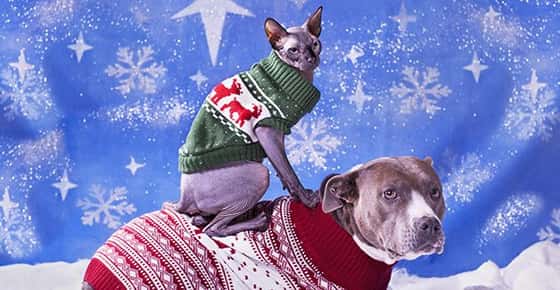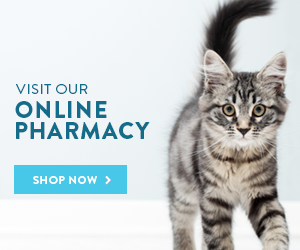
This winter, while you curl up next to the fire with a cozy blanket, a good book and some hot chocolate, don't forget about your pet! Winter can play it rough with your pet and you have to look out for his health and well-being. Here are some preparations you should make to help your pet prepare for the winter.
Nutrition - Perhaps the most important consideration for preparing your pet for winter is nutrition. Outdoor pets in particular require more calories in the winter to generate enough energy to cope with cold. A high quality nutritionally balanced diet is adequate to meet these increased demands, therefore most pets will not require supplementation with vitamins. In addition to a good diet, fresh water should be offered several times a day. However, when temperatures dip below freezing, Rover's water will turn into ice, leaving him high and dry. If you have an outdoor dog, consider investing in a heated water bowl, which retails for about $30.
Shelter - While dogs and cats do have fur coats, they're still vulnerable to wind and water. If your pet lives outdoors, provide a fully sheltered den with dry bedding; special pet-safe heating pads can provide extra warmth. The shelter should be elevated, insulated, wind- and watertight. The shelter should not be so large that they cannot preserve their body heat. But if the wind chill dips to 20 below, bring them inside.
Health - Shivering is the earliest indication your pet is too cold. As hypothermia progresses, the pet becomes lethargic and weak, and his gums may turn pale or bluish. Frostbite is dangerous because it normally goes unnoticed beneath fur. It affects ears, feet, tail, scrotum and mammary glands. After the initial numbness, pain and skin sloughing may occur. Don't leave your pet outdoors after cold-weather exercise. Dry your pet off and bring it indoors and let it rest and get warm.
Hazards - Salts and other chemicals used to clear streets and sidewalks can irritate pets' feet. Check the labels if you use snow or ice melt to make sure they are animal-safe. Another winter hazard to pets is antifreeze, which is extremely toxic. Store antifreeze where it cannot be reached by pets and/or children. If you suspect that your pet has ingested antifreeze, do not wait for symptoms- get your pet to your veterinarian immediately. Indoor pets face special challenges, too. Vets see more cats with respiratory ailments in the winter due to long-term exposure to wood smoke, so good ventilation is important. To avoid any complications it is best to take your pet to have a check-up before the worst of the winter kicks in.
Winter Blues - Fewer hours of day light mean fewer opportunities for outdoor exercise during the winter months. Energetic dogs who require lots of active play can become frustrated and depressed and this can lead to a variety of problem behaviors- from barking and howling, to chewing furniture or messing in the house. Experts believe that pets, especially dogs, do not get the winter blues. They believe that your pet's lethargic and depressed behavior mirror your own feelings, as most pets are very sensitive to the emotional condition of their owners. Therefore, if you are prone to developing winter blues, take care of yourself (and your pet). Eat healthy and include regular exercise and fresh air in your daily program. Go for walk with your pet or play in the park for a few minutes. Fresh air and sunlight are the two most important ingredients that fight winter blues.

